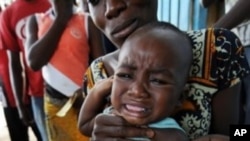Health workers in West Africa are wrapping up the largest ever program to immunize people against Yellow Fever. Left untreated, the disease kills more than 30,000 people a year.
In Liberia, the community group Crusader For Peace has been holding rallies to encourage people to turn out for the immunization program.
The group's head, Julie Endee, says this campaign against yellow fever has reached deeper into Liberian communities because it has had the backing of both traditional and religious leaders.
"We talked to the leaders, they pledged their support. We visited the Muslim community," said Endee. "We asked them for their support, and they pledged their support. We asked the Christian community, and they pledged their support."
It is part of the largest ever mass yellow-fever immunization program targeting 12 million people in Liberia, Sierra Leone and Benin.
Spread by infected mosquitoes, the hemorrhagic virus causes symptoms from nausea to kidney failure and jaundice and can be fatal.
Health Minister Walter Gwenigale says the disease cannot be taken for granted.
"When there is one case in the country, you call it an outbreak," said Gwenigale.
The health minister says Liberia has 12 confirmed cases.
"Once you get it, we cannot treat you, because there is no treatment," said Gwenigale. "Those who get the second stage, where the virus has attacked the cells of the liver, those are the ones who will most likely die from it."
Liberia is one of 36 countries in Africa still reporting cases of Yellow Fever. Rosamund Lewis of the World Health Organization's Yellow Fever Initiative says the vaccine being used today is the same as the one first created in 1937.
"It is one of the most effective, cost-effective public health tools we have available to us," said Lewis. "In these countries, we estimate that 160 million people may still be at risk of yellow fever, and that includes the urban centers where these terrible outbreaks can take place."
Nigeria, Ghana, Ivory Coast, Guinea and the Central African Republic are also at risk from this virus.
Dr. Lewis says more than 29 million people have been protected through mass vaccinations in West and Central Africa since 2007.
This week's campaign in Liberia also included a vaccination center at the University of Liberia where student Cooper Vuku says he hopes to stay yellow-fever free.
"To remain healthy, you have to take the necessary treatment in order to be a healthy person," said Vuku. "So I feel glad to have taken this vaccine today, and I am hopeful that I will be well."
The World Health Organization says the number of yellow fever cases in Africa has increased over the past two decades because of deforestation, urbanization and the declining immunity of a younger population.




